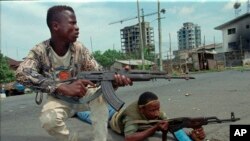Kamara, 47, is accused of “complicity in massive and systematic torture and inhumane acts” against civilians in Liberia's Lofa county in 1993-1994, as one of the leaders of the Ulimo armed group. He was then less than 20 years old at the time.
Kamara was arrested near Paris in 2018 and is now is facing life imprisonment. He maintains he is innocent.
During the investigation, he acknowledged having been a battlefield commander, leading about 80 soldiers during the civil war — a choice he said he made to defend himself against Charles Taylor's rival faction.
Kamara is being accused of hitting a man and then opened his chest with an ax in order to extract and eat his heart, according to court documents. He is also accused of having allowed and abetted rapes, sexual torture and compelling people into forced labor under inhumane conditions.
The trial by the Paris criminal court has been made possible under a French law that recognizes universal jurisdiction for crimes against humanity and acts of torture
Hassan Bility, head of the Global Justice and Research Project, told The Associated Press that the trial "is a victory for Liberian victims and a warning to perpetrators that no matter where they are, we’re going to make sure they’re held accountable for the crimes they committed in Liberia.”
The Human Rights Watch (HRW) and the International Federation for Human Rights (FIDH) stressed in a statement that Liberia’s first civil war was especially marked by "violence against civilians, as warring factions massacred and raped civilians, pillaged, and forced children to kill and fight.”
Elise Keppler, HRW associate international justice director, said the trial is especially important due to “the failure of Liberian authorities to hold to account those responsible for serious crimes during the civil wars.”
Liberia’s back-to-back civil wars killed an estimated 250,000 people between 1989 and 2003.
The country's post-war truth and reconciliation commission in 2009 recommended prosecution for dozens of ex-warlords and their commanders bearing greatest responsibilities for the war.
But successive governments have largely ignored the recommendations, much to the disappointment and frustration of war victims.
Political analysts say this is largely because some of the key players in the war have occupied influential positions in government, including in the legislature, since the end of the war nearly 30 years ago.
During her visit to Liberia last week, the U.S. ambassador on war crimes, Dr. Beth Van Schaack, promised her government would support Liberia in this endeavor and claimed that the U.S. will partner with Liberia to achieve justice.
“100%” support Liberia if the country decided to establish a court to look into its past. That if something starts to move, that we should be a partner in that effort.”
The Paris trial, scheduled to last four weeks, is the fifth dealing with crimes against humanity and torture in France. The trial will be filmed to constitute historical archives.









